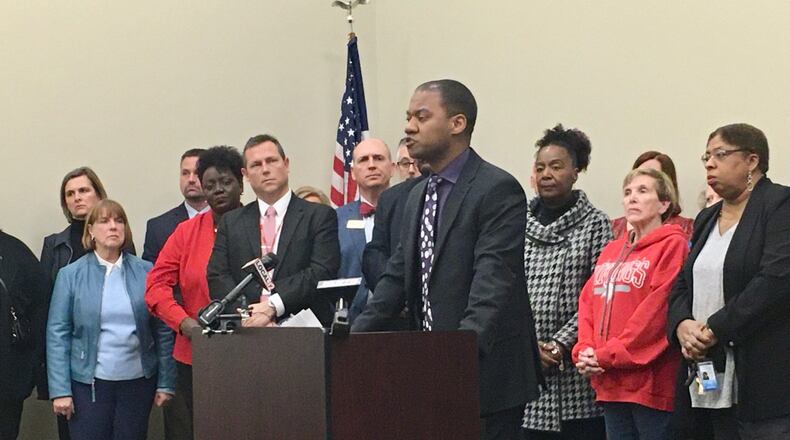DECEMBER: High-scoring public schools now subject to voucher
But a series of recent developments has triggered a rush to change the EdChoice law before Feb. 1, when applications for 2020-21 vouchers begin. If there’s no change, thousands more families in high-scoring public school districts such as Beavercreek, Tipp City and Centerville would be eligible for private-school vouchers, as the state deems them “underperforming.”
While there’s fairly broad agreement on a few changes, some fear the legislative process is moving too fast.
“I have a very grave concern that the EdChoice discussion is a major, major policy issue that is likely to be resolved in a very inadequate manner, because of that calendar,” Senate Education Committee Chair Peggy Lehner told the state school board on Tuesday. “l think we are at great risk of a solution that in the long run is not good for the children of this state.”
Lehner, R-Kettering, is advocating for a very narrow legislative change this month, rolling back some recent changes that expanded eligibility in high-performing schools, followed by a “robust debate” on the program as a whole.
LOCAL: Which schools have high, low college remediation rate?
But Sen. Matt Huffman, a longtime supporter of the voucher program, is pushing for a major change right now that would tie all vouchers to income levels, and make a family of four earning up to $103,000 a year eligible for state aid to attend private school.
“If the family decides … that character development or atmosphere or religious instruction or a whole variety of other things like, hey, that’s where we went to school … if the family decides, here’s what we think is the best thing for the child, but they can’t afford it, that’s the purpose of this program,” said Huffman, R-Lima. “It’s a focus on the family and the individual and not on the institution.”
When the House and Senate return to work Tuesday, they’ll have 10 days to get a bill through committee hearings, then floor votes in both chambers. House GOP spokeswoman Taylor Jach said Thursday that legislative leadership was still “working to build consensus so we have an agreed-upon draft of a bill.”
Credit: JEREMY P. KELLEY / STAFF
Credit: JEREMY P. KELLEY / STAFF
Roughly 40 percent of Carroll High School students use EdChoice vouchers, and Principal Matt Sableski called this pins-and-needles time, saying changes in the law “could sway our budget pretty dramatically.”
2019 STORY: Private-school voucher program to double in 19-20
“From our perspective, all of this is too late because … registration happened Dec. 1,” Sableski said. “People were applying and registering for Carroll High School assuming that the list of public schools that was published by the state and the law that had already passed would be current. If that doesn’t happen, families will have to reset, and that’s a tough thing for them and us.”
Public schools are upset with multiple EdChoice changes that have significantly expanded eligibility for the program, and would lead to another dramatic expansion this fall, from 487 public schools to 1,233. Local school boards in Kettering, Dayton and other local districts are passing resolutions calling for complete repeal of the private-school voucher program.
Many suburban school districts receive $2,000 to $3,000 per student in state aid based on Ohio’s formula. But when a student leaves that district via voucher to attend a private school, the state sends $4,650 (grades K-8) or $6,000 (grades 9-12) in voucher funding, affecting the public schools’ bottom line. Some students for whom the public schools have received no funding also could be eligible for vouchers.
In a letter to legislators last month, Northmont schools Superintendent Tony Thomas argued the EdChoice program “should not divert local taxpayer money from public school budgets to private schools under any circumstances,” calling that process a taxpayer subsidy for private schools.
2018 STORY: Task force tackles poverty’s impact on education
The definition of an “underperforming public school” in EdChoice also has come under fire. The most startling example is Parkside Elementary in Solon, near Cleveland, which ranks fifth-best of 3,248 Ohio schools in performance index on state tests, but is deemed underperforming because the state formula says their students didn’t make enough progress the past two years.
Locally, Dayton’s Horace Mann Elementary, with A’s in both student progress and gap closing last year, is listed as underperforming, as is Lebanon’s Donovan Elementary, which had no grade below a “C.” Huffman and Lehner both said schools with overall A’s, B’s and C’s on the report card should come off the voucher eligibility list.
Huffman argued in favor of a provision that public schools oppose, allowing a private-school eighth-grader, even if they never attended their local “underperforming” public school, to qualify for a voucher when they start high school. Huffman said the last state budget allocated an extra $50 million for the EdChoice expansion program on top of previously planned increases.
But he said related language that allows students already attending private high schools to qualify for vouchers was not his intent and should be repealed. Huffman said he wasn’t aware that provision had been added to the law until a month ago.
SENATOR: Voucher program doesn’t consider quality of school
Lehner said that level of complexity is exactly why the legislature shouldn’t try a major overhaul of state law in 10 days, arguing that it would result in a major voucher expansion that is inappropriate without further study.
“Don’t be lulled into thinking there’s an easy fix for this. … This is very complicated and absolutely requires intensive debate,” Lehner said. “We need to be very careful in whatever we put in place to fix this situation, that we are not creating bigger and more extensive problems down the road.”
About the Author



